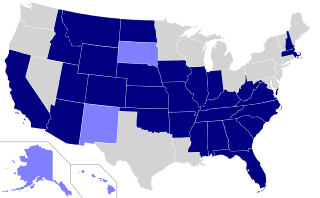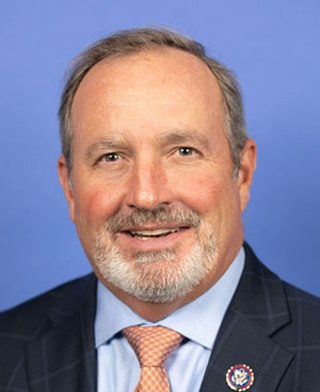The American Sovereignty Restoration Act is a bill that has been introduced by various members of Congress, proposing withdrawal from the United Nations. The most recent iteration is H.R.7806, the American Sovereignty Restoration Act of 2022, introduced by Rep. Mike D. Rogers. [1]
The 2007 bill (H.R. 1146) was authored by U.S. Representative Ron Paul, Republican of the 14th district of Texas, to effect U.S. withdrawal from the United Nations. It would repeal various laws pertaining to the UN, terminate authorization for funds to be spent on the UN, terminate UN presence on U.S. property, and withdraw diplomatic immunity for UN employees. [2] It would provide up to two years for the U.S. to withdraw. [3] The Yale Law Journal cited the Act as proof that "the United States’s complaints against the United Nations have intensified." [4]
The bill was reintroduced in 2009 as H.R. 1146.
In a letter to Majority Leader Tom DeLay of April 16, 2003, and in a speech to Congress on April 29, Paul requested the repeatedly-bottlenecked issue be voted on, because "Americans deserve to know how their representatives stand on the critical issue of American sovereignty." [5] Though he did not foresee passage in the near future, Paul believed a vote would be good for "those who don't want to get out of the United Nations but want to tone down" support; cosponsor Roscoe Bartlett's spokeswoman similarly said Bartlett "would welcome any action that would begin the debate".
In 1997, an amendment containing the bill received a floor vote, with 54 representatives voting in favor. [6] [7] [8]
In December 2023, U.S. Senator Mike Lee and U.S. Representative Chip Roy introduced UN withdrawal legislation titled the “Disengaging Entirely from the United Nations Debacle (DEFUND) Act.” [9] [10] [11] The legislation was closely modeled on the ASRA. [12]
National Review cited the ASRA as an example of grassroots effort "to educate the American people about the efforts of foreign tyrants to disarm them". [13]
On its front page, the Victoria, Texas, Advocate, a newspaper in Paul's district, expressed pride for the Act in the face of what it called several undeclared "United Nations wars". [14]
Tim Wirth, president of the United Nations Foundation, finds the bill contrary to United States interests: "This piece of legislation has been brought by Ron Paul every year over the last 20 years and it never goes anywhere."
A policy review of U.S.-Canada relations describes the Act as reflective of "extreme views" held by a minority, but connected support for the bill among congressional Republicans as part of a broader push among Republicans for President George W. Bush "to be even tougher on immigration policy, border issues, regime change and a host of other issues connected with global governance." [15]
The 2002 Republican Party of Texas platform explicitly urged passage of the ASRA; withdrawal from the UN had been on the platform at least since 1998. [16]
Both houses of the Arizona legislature introduced legislation petitioning Congress to pass the ASRA (HCM 2009 in 2004, SCM 1002 in 2006); [17] [18] in 2007 similar legislation passed the Arizona Senate (SCM 1002 in 2007), but with the focus changed from the ASRA to Virgil Goode's Congressional resolution not to engage in a NAFTA Superhighway or a North American Union (H.Con.Res. 487, now H.Con.Res. 40). [19] [20]
In 2000, Tom DeWeese's American Policy Center said it delivered to Congress more than 300,000 signatures from petitions in support of the Act. [21]
An organization calling itself the Liberty Committee also organized a nationwide petition drive asking Majority Leader Tom DeLay to schedule the bill for a vote. [22]
A pocket veto is a legislative maneuver that allows a president or other official with veto power to exercise that power over a bill by taking no action, thus effectively killing the bill without affirmatively vetoing it. This depends on the laws of each country; the common alternative is that if the president takes no action a bill automatically becomes law.

The Authorization for Use of Military Force Against Iraq Resolution of 2002, informally known as the Iraq Resolution, is a joint resolution passed by the United States Congress in October 2002 as Public Law No. 107-243, authorizing the use of the United States Armed Forces against Saddam Hussein's Iraq government in what would be known as Operation Iraqi Freedom.
The United States is a charter member of the United Nations and one of five permanent members of the UN Security Council.

Harold Trent Franks is an American businessman and former politician who served as the U.S. representative for Arizona's 8th congressional district from 2003 to 2017. He is a member of the Republican Party. During his tenure, Franks served as vice chairman of the United States House Armed Services Subcommittee on Strategic Forces and chairman of the United States House Judiciary Subcommittee on the Constitution, Civil Rights and Civil Liberties.

Edward Randall Royce is an American politician who served as a member of the United States House of Representatives from California from 1993 to 2019. A member of the Republican Party, Royce served as Chairman of the United States House Committee on Foreign Affairs from 2013 to 2019. He previously served as a member of the California Senate from 1982 to 1993.

John Elmer Linder is an American politician who was a member of the United States House of Representatives from 1993 to 2011. His district was numbered the 4th from 1993 to 1997, the 11th from 1997 to 2003, and the 7th from 2003 until 2011. He is a member of the Republican Party.

Michael Keith Simpson is an American politician serving as the U.S. representative for Idaho's 2nd congressional district since 1999. The district covers most of the eastern portion of the state, including Idaho Falls, Pocatello, Sun Valley, Twin Falls and the northern two-thirds of Boise. A member of the Republican Party, Simpson was first elected to public office in 1984, and was elected to the House in the 1998 elections, succeeding Mike Crapo. He served as Speaker of the Idaho House of Representatives from 1992 to 1998.

Eliot Lance Engel is an American politician who served as a U.S. representative from New York from 1989 to 2021. A member of the Democratic Party, he represented a district covering portions of the north Bronx and southern Westchester County.

Voting rights of citizens in the District of Columbia differ from the rights of citizens in the 50 U.S. states. The United States Constitution grants each state voting representation in both houses of the United States Congress. It defines the federal district as being outside of any state, and does not grant it any voting representation in Congress. The Constitution grants Congress exclusive jurisdiction over the District in "all cases whatsoever".

Yvette Diane Clarke is an American politician serving as the U.S. representative for New York's 9th congressional district since 2013. A member of the Democratic Party, she first entered Congress in 2007, representing New York's 11th congressional district until redistricting. Clarke represented the 40th district in Brooklyn on the New York City Council from 2002 to 2006.
Withdrawal from the United Nations by member states is not provided for in the United Nations Charter.

Dr. Ron Paul is an American author, activist, and retired politician who served in the House of Representatives for twelve non-consecutive terms and ran for President of the United States on three occasions. His political views are generally described as libertarian, but have also been labeled conservative. Paul's nickname "Dr. No" reflects both his medical degree and his assertion that he will "never vote for legislation unless the proposed measure is expressly authorized by the Constitution". This position has frequently resulted in Paul casting the sole "no" vote against proposed legislation. In one 2007 speech, he said he believes that "the proper role for government in America is to provide national defense, a court system for civil disputes, a criminal justice system for acts of force and fraud, and little else."

Ann Leila Kirkpatrick is an American politician and retired attorney who served as the U.S. representative for Arizona's 2nd congressional district from 2019 to 2023. A member of the Democratic Party, she represented Arizona's 1st congressional district from 2009 to 2011, and again from 2013 to 2017. Kirkpatrick was a member of the Arizona House of Representatives from 2005 to 2007.
The Violent Radicalization and Homegrown Terrorism Prevention Act of 2007 was a bill sponsored by Rep. Jane Harman (D-CA) in the 110th United States Congress. Its stated purpose is to deal with "homegrown terrorism and violent radicalization" by establishing a national commission, establishing a center for study, and cooperating with other nations.
There have been various proposals for the United States to withdraw from the United Nations, where it is one of the founding members and one of the five permanent members of the United Nations Security Council.

The Puerto Rico Democracy Act is a bill to provide for a federally sanctioned self-determination process for the people of Puerto Rico.

The English Language Unity Act was first introduced in 2005. It hoped to establish English as the official language of the federal government of the United States. If enacted it would require that all official functions and proceedings of federal and state government be conducted in English. It would also require that applicants for naturalization be tested on their ability to read and generally understand the English language. They would be tested on the laws of the United States as well as other important documents that relate to the law, including the Declaration of Independence and Constitution. It would also require that all naturalization ceremonies be conducted in English. If a person became injured because of violations of this act, they would be able to file suit in court. Before this act could be considered by the House of Representatives it had to be approved by the House Judiciary, and Education and the Workforce Committees.

Jeffrey Darren Duncan is a United States representative for South Carolina's 3rd congressional district since 2011. His district comprises nine counties, two of these counties being manufacturing centers for the state. On January 17, 2024, Duncan announced that he would not run for re-election. Duncan previously served in the South Carolina House of Representatives from 2002 to 2010 when he retired to run for the U.S. House of Representatives.

Andrew Steven Biggs is an American attorney and politician who represents Arizona's 5th congressional district in the United States House of Representatives. The district, which was once represented by U.S. Senators John McCain and Jeff Flake, is in the heart of the East Valley and includes most of Mesa and Chandler and all of Queen Creek and Biggs's hometown of Gilbert.

The Creating a Respectful and Open World for Natural Hair Act of 2022 was a bill in the United States Congress intended to prohibit discrimination based on an individual's hair texture or hairstyle by classifying such discrimination illegal under federal law. It applied to federally assisted programs, housing programs, public accommodations, and employment. The act was introduced in the House of Representatives by Congresswoman Bonnie Watson Coleman (D-NJ) on March 19, 2021. Senator Cory Booker (D-NJ) introduced a companion bill in the Senate on March 22, 2021. The CROWN Act of 2022 marked the second time the legislation was introduced in Congress.